- Home
- Haruki Murakami
First Person Singular Page 4
First Person Singular Read online
Page 4
Here are the names of the tracks:
Side A
(1) Corcovado
(2) Once I Loved (O Amor em Paz)
(3) Just Friends
(4) Bye Bye Blues (Chega de Saudade)
Side B
(1) Out of Nowhere
(2) How Insensitive (Insensatez)
(3) Once Again (Outra Vez)
(4) Dindi
With the exception of “Just Friends” and “Out of Nowhere,” these are all well-known pieces composed by Carlos Jobim. The two pieces not by Jobim are both standards familiar from Parker’s earlier magnificent performances, though of course here they are done in a bossa nova rhythm, a totally new style. (And on these two pieces only, the pianist wasn’t Jobim but the versatile veteran pianist Hank Jones.)
So, lover of jazz that you are, what’s your first reaction when you hear the title Charlie Parker Play Bossa Nova? A yelp of surprise, I would imagine, followed by feelings of curiosity and anticipation. But soon wariness must raise its head—like ominous dark clouds appearing on what had been a beautiful, sunny hillside.
Hold on just a minute—are you telling me that Bird—Charlie Parker—is actually playing bossa nova? Seriously? Did Bird himself really want to play that kind of music? Or did he give in to commercialism, talked into it by the record company, and reach out for what was popular at the time? Even if, say, he genuinely wanted to perform that kind of music, would the style of this 100 percent bebop alto sax player ever harmonize with the cool sounds of Latin American bossa nova?
Setting aside all that—after an eight-year hiatus, was he still master of his instrument? Did he still retain his powerful performing skills and creativity?
Truth be told, I couldn’t help feeling uneasy about all that myself. I was dying to hear that music, but at the same time I felt afraid, frightened of disappointment from what I might hear. But now, after I’ve listened intently to the disc over and over, I can state one thing for sure: I’d even climb up to the roof of a tall building and shout it out so the whole town could hear. If you love jazz, or have any love for music at all, then you absolutely must listen to this charming record, the fruit of a passionate heart, and a cool mind…
What’s surprising, first of all, is the indescribable interplay between Carlos Jobim’s simple, economical piano style and Bird’s eloquent, uninhibited phrasing. I know you might object that Jobim’s voice (he doesn’t sing here, so I’m referring only to his instrumental voice) and Bird’s voice are so totally different in quality, with dissimilar objectives. We’re talking about two very different voices here, so different it might be hard to find any points they share. On top of that, neither one seems to be making much of an effort to revamp their music to fit that of the other. But it’s exactly that—the sense of being out of joint, the divergence between the two men’s voices—that is the very driving force that gave rise to this uniquely lovely music.
I’d like you to start by listening to the first track on the A side, “Corcovado.” Bird doesn’t play the opening theme. In fact, he doesn’t take up the theme until one phrase at the end. The piece starts with Carlos Jobim quietly playing that familiar theme alone on the piano. The rhythm section is simply mute. The melody calls to mind a young girl seated at a window, gazing out at the beautiful night sky. Most of it is done with single notes, with the occasional no-frills chords added. As if gently tucking a soft cushion under the girl’s shoulders.
And once that performance of the piano theme is over, Bird’s alto sax quietly enters, a faint twilight shadow slipping through a gap in the curtain. He’s there, before you even realize it. These graceful, seamless phrases are like lovely memories, their names hidden, slipping into your dreams. Like fine wind patterns you never want to disappear, leaving gentle traces on the sand dunes of your heart…
I’ll omit the rest of the article, which is simply a further description with all the suitable embellishments. The above gives you an idea of the kind of music I’m talking about. Of course it’s music that doesn’t actually exist. Or, at least, music that couldn’t possibly exist.
* * *
—
I’ll wrap up that story here, and talk about something that took place years later.
For a long time I totally forgot that I’d written that article back in college. My life after school turned out to be more harried and busy than I’d ever imagined, and that review of a make-believe album was nothing more than a lighthearted, irresponsible joke I’d played when I was young. But now, close to fifteen years later, this article unexpectedly reemerged into my life, like a boomerang you threw that whirls back to you when you least expect it.
I was in New York on business and, with time on my hands, took a walk near my hotel and ducked inside a small used-record store I came across on East Fourteenth Street. And in the section of Charlie Parker records I found, of all things, a record titled Charlie Parker Plays Bossa Nova. It looked like a bootleg, a privately pressed recording. On the front was a white jacket with no drawing or photo, just the title in sullen black letters. On the back was a list of the tracks and the musicians. Surprisingly, the list of songs and musicians was exactly as I’d made them up back in college. Likewise, Hank Jones sat in for Carlos Jobim on two tracks.
I stood there—still, speechless—record in hand. It felt like some small internal part of me had gone numb. I looked around again. Was this really New York? This was downtown New York—no doubt about it. And I was actually here, in a small used-record store. I hadn’t wandered into some fantasy world. Nor was I having some super-realistic dream.
I slipped the record out of its jacket. It had a white label, with the title and names of the songs. No sign of a record company logo. I examined the vinyl itself and found four distinct tracks on each side. I went over and asked the long-haired young guy at the register if I could take a listen to the album. No, he replied. The store turntable’s broken. Sorry about that.
The price on the record was $35. I wavered for a long time about whether to buy it. In the end, I left the shop empty-handed. I figured, it’s got to be somebody’s idea of a silly joke. Somebody, on a whim, had faked a record based on my long-ago description of an imaginary recording. Took a different record that had four tracks on each side, soaked it in water, peeled off the label, and glued on a homemade one. Any way you look at it, it was ridiculous to pay $35 for a bogus record like that.
I went to a Spanish restaurant near the hotel and had some beer and a simple dinner by myself. Afterward, as I was strolling around aimlessly, a wave of regret suddenly welled up in me. I should have bought that record. Even if it was a fake, and even if it was way overpriced, I should have bought it, at the very least as a souvenir of all the twists and turns my life had taken. I went straight back to Fourteenth Street. I hurried, but the record store was closed by the time I got there. On the shutter was a sign that said the store opened at 11:30 a.m. and closed at 7:30 p.m. on weekdays.
The next morning, just before noon, I went over to the store again. A middle-aged guy—thinning hair, in a disheveled, round-necked sweater—was sipping coffee and reading the sports section of the paper. The coffee seemed freshly brewed, for a pleasant smell wafted faintly through the store. The store had just opened, and I was the only customer. An old tune by Pharoah Sanders filtered through the small speaker on the ceiling. I assumed the man was the store’s owner. I thumbed through the Charlie Parker section, but that record was nowhere to be found. I was sure I’d returned the record to that section yesterday. Thinking it might have gotten mixed in elsewhere, I rifled through every bin in the jazz section. But as hard as I looked, no luck. Had someone else bought it since my visit yesterday? I went over to the register and spoke to the middle-aged guy. “I’m looking for a jazz record I saw here yesterday.”
“Which record?” he asked, eyes never wavering from The New York Times.
“Charlie Parker Plays Bossa Nova,” I said.
He laid down his paper, took off his thin, metal-framed reading glasses, and slowly turned to face me. “I’m sorry. Could you repeat that?”
I did. The man said nothing, and took another sip of coffee. He shook his head slightly. “There’s no such record.”
“Of course,” I said.
“If you’d like Perry Como Sings Jimi Hendrix, we have that in stock.”
“Perry Como Sings—” I got that far before I realized he was joking, even though he did so with a straight face. “But I really did see it,” I insisted. “I was sure it was produced as a joke, I mean.”
“You saw that record here?”
“Yesterday afternoon. Right here.” I described the record, the jacket and songs on it. How it had been priced at $35.
“There’s gotta be some mistake. We’ve never had that kind of record. I do all the purchasing and pricing of jazz records myself, and if a record like that had crossed my desk, I would definitely have remembered it. Whether I wanted to or not.”
He shook his head and put his reading glasses back on. He went back to reading the sports section, but then, as if he’d had second thoughts, he removed his glasses, smiled, and gazed steadily at me. “But if you ever do get hold of that record,” he said, “let me listen to it, okay?”
* * *
—
There’s one more thing that came later on.
This happened a long time after that incident (in fact, quite recently). One night I had a dream about Charlie Parker. In the dream, he performed “Corcovado” just for me—for me alone. Solo alto sax, no rhythm section.
Sunlight was shining in from some gap somewhere, and Parker was standing by himself in a spot lit up by the long, vertical beam. Morning light, I assumed. Fresh, honest light that was still free of any superfluous meaning. Bird’s face, facing me, was hidden in deep shadow, but I could somehow make out the dark double-breasted suit, white shirt, and brightly colored tie. And the alto sax he had, which was absurdly filthy, covered in dirt and rust. There was one bent key he’d barely kept in place by taping the handle of a spoon to it. When I saw that, I was puzzled. Even Bird wouldn’t be able to get a decent sound out of that poor excuse for an instrument.
Suddenly, right then, my nose detected an amazingly fragrant aroma of coffee. What an entrancing smell. The aroma of hot, strong black coffee. My nostrils twitched with pleasure. For all the temptations of that smell, I never took my eyes off Bird. If I did, even for a second, he might vanish from sight.
I’m not sure why, but I knew then it was a dream. That I was seeing Bird in a dream. That happens sometimes. When I’m dreaming I know for certain—This is a dream. And I was strangely impressed that in the midst of a dream I could catch, so very clearly, the enticing smell of coffee.
Bird finally put lips to the mouthpiece and carefully blew one subdued sound, as if checking the condition of the reed. And once that sound had faded away over time, he quietly lined up a few more notes the same way. The notes floated there for a time, then gently fell to the ground. They fell to the ground, one and all, and once they were swallowed up by the silence, Bird sent out a series of deeper, more resilient notes into the air. That’s how “Corcovado” started.
How to describe that music? Looking back on it, this music Bird played just for me in my dream felt less like a stream of sound than like a momentary, total irradiation. I can vividly remember the music being there. But I can’t reproduce it. With time, it’s faded away, like the inability to describe the design of a mandala. What I can say is that it was music that reached to the deep recesses of my soul, all the way down to the very core. I was certain that kind of music existed in the world—music that made you feel like something in the very structure of your body had been reconfigured, ever so slightly, now that you’d experienced it.
* * *
—
“I was only thirty-four when I died,” Bird said to me. “Thirty-four!” At least I think he was saying it to me. Since we were the only two people in the room.
I didn’t know how to respond. It’s hard in dreams to do the right thing. So I stayed silent, waiting for him to go on.
“Think about it—what it is to die at thirty-four,” Bird went on.
I thought about how I’d feel if I’d died at thirty-four. When I’d only just begun so many things in life.
“That’s right. I’d only begun things myself,” Bird said. “Only begun to live my life. But then I looked around me and it was all over.” He silently shook his head. His entire face was still hidden in shadow, so I couldn’t see his expression. His dirty, battered saxophone hung from the strap around his neck.
“Death always comes on suddenly,” Bird said. “But it also takes its time. Like the beautiful phrases that come into your head. It lasts an instant, yet those instants can draw out forever. As long as from the East Coast to the West Coast—or to infinity, even. The concept of time is lost there. In that sense, I might have been dead even as I lived out my life. But actual death is a crushing. What’s existed until then suddenly and completely vanishes. Returns to nothingness. In my case, that existence was me.”
He looked down for a time, staring at his instrument. And then he spoke again.
“Do you know what I was thinking about when I died?” Bird asked. “My mind had just one thought—a single melody. I kept on humming that melody over and over in my head. It just wouldn’t let go. That happens, right? A tune gets stuck in your head. That melody was a phrase from the third movement of Beethoven’s Piano Concerto no. 1. This melody.”
Bird softly hummed the melody. I recognized it. The solo piano part.
“This is the one Beethoven melody that really swings,” Bird said. “I’ve always liked his Concerto no. 1. I’ve listened to it I don’t know how many times. The SP record with Schnabel on piano. But it’s strange, don’t you think? That me—Charlie Parker—when I died I was humming, of all things, a Beethoven melody in my mind, over and over. And then came darkness. Like a curtain falling.” Bird gave a little laugh, his voice hoarse.
No words came to me. What could I possibly say about the death of Charlie Parker?
“Anyway, I need to thank you,” Bird said. “You gave me life again, this one time. And had me play bossa nova. Nothing could make me happier. Of course being alive and actually playing would have been even more exciting. But even after dying, this was a truly wonderful experience. Since I always loved new music.”
So did you appear here today in order to thank me?
“That’s right,” Bird said, as if reading my mind. “I stopped by to express my thanks. To say thank you. I hope you enjoyed my music.”
I nodded. I should have said something, but couldn’t for the life of me come up with the right response.
“Perry Como Sings Jimi Hendrix, eh?” Bird murmured, as if recalling. And chuckled again in a hoarse voice.
And then he vanished. First his saxophone disappeared, next the light shining in from somewhere. And finally, Bird himself was gone.
* * *
—
When I woke up from the dream, the clock next to my bed read 3:30 a.m. It was still dark out, of course. The fragrance of coffee that should have filled the room was gone. There was no fragrance at all. I went to the kitchen and gulped down a couple of glasses of water. I sat down at the dining table, and tried once more to reproduce, if even a little, that amazing music that Bird had played just for me. I couldn’t recall a single phrase. But I could remember what Bird had said. Before they faded from memory, I wrote down his words, with a ballpoint pen in a notebook, as accurately as I could. That was the only action I could take. Bird had visited my dream in order to thank me—that much, I recalled. To thank me for allowing him the opportunity, so many years ago, to play bossa nova. And he grabbed an instrument th
at happened to be around and played “Corcovado” just for me.
Can you believe it?
You’d better. Because it happened.
It really did.
. . .
WITH THE BEATLES
What I find strange about growing old isn’t that I’ve gotten older. Not that the youthful me from the past has, without my realizing it, aged. What catches me off guard is, rather, how people from the same generation as me have become elderly, how all the pretty, vivacious girls I used to know are now old enough to have a couple of grandkids. It’s a little disconcerting—sad, even. Though I never feel sad at the fact that I have similarly aged.
I think what makes me feel sad about the girls I knew growing old is that it forces me to admit, all over again, that my youthful dreams are gone forever. The death of a dream can be, in a way, sadder than that of a living being. Sometimes it all seems so unfair.
There’s one girl—a woman who used to be a girl, I mean—whom I remember well. I don’t know her name, though. And, naturally, I don’t know where she is now or what she’s doing. What I do know about her is that she went to the same high school as I did, and was in the same year (since the badge on her shirt was the same color as mine), and that she really liked the Beatles. Other than that, I know nothing about her.
This was in 1964, at the height of Beatlemania. It was early autumn. The new school semester had begun and things were starting to fall into a routine again. She was hurrying down the long, dim hallway of the old school building, her skirt fluttering. I was the only other person there. She was clutching an LP to her chest as if it were something precious. The LP With the Beatles. The one with the striking black-and-white photograph of the four Beatles in half shadow. For some reason, I’m not sure why, I have a clear memory that it was the original, British version of the album, not the American or the Japanese version.

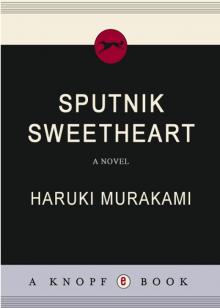 Sputnik Sweetheart
Sputnik Sweetheart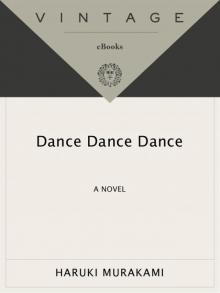 Dance Dance Dance
Dance Dance Dance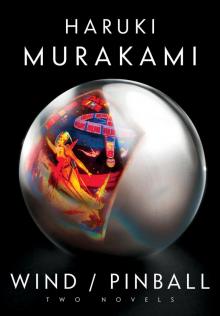 The Wind (1) and Up Bird Chronicle (2)
The Wind (1) and Up Bird Chronicle (2)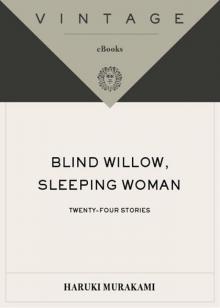 Blind Willow, Sleeping Woman
Blind Willow, Sleeping Woman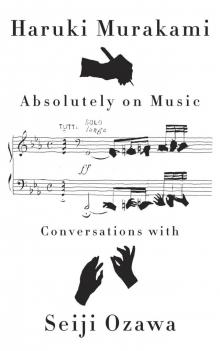 Absolutely on Music: Conversations With Seiji Ozawa
Absolutely on Music: Conversations With Seiji Ozawa Norwegian Wood
Norwegian Wood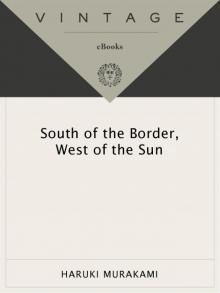 South of the Border, West of the Sun
South of the Border, West of the Sun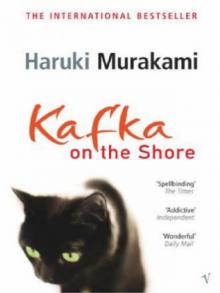 Kafka on the Shore
Kafka on the Shore Men Without Women
Men Without Women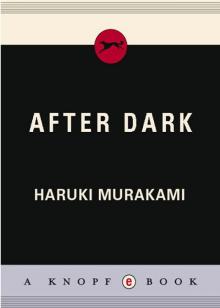 After Dark
After Dark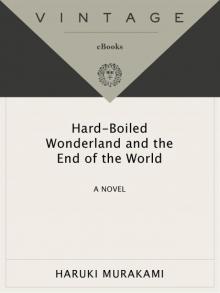 Hard-Boiled Wonderland and the End of the World
Hard-Boiled Wonderland and the End of the World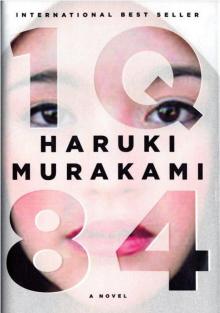 1q84
1q84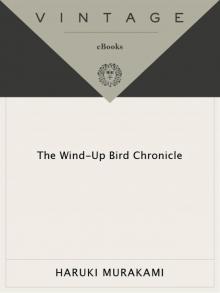 The Wind-Up Bird Chronicle
The Wind-Up Bird Chronicle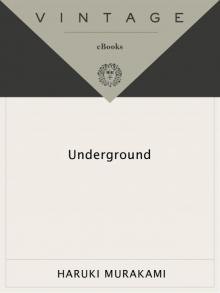 Underground: The Tokyo Gas Attack and the Japanese Psyche
Underground: The Tokyo Gas Attack and the Japanese Psyche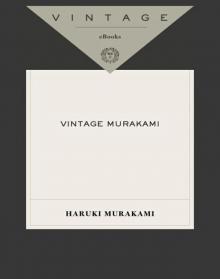 Vintage Murakami
Vintage Murakami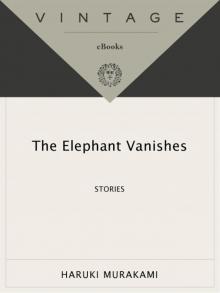 The Elephant Vanishes: Stories
The Elephant Vanishes: Stories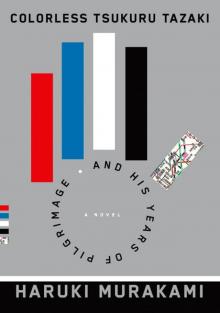 Colorless Tsukuru Tazaki and His Years of Pilgrimage
Colorless Tsukuru Tazaki and His Years of Pilgrimage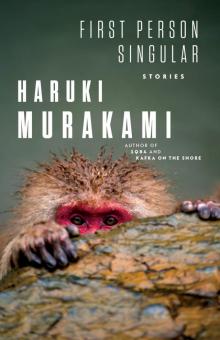 First Person Singular
First Person Singular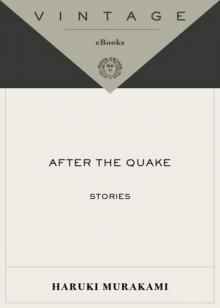 After the Quake
After the Quake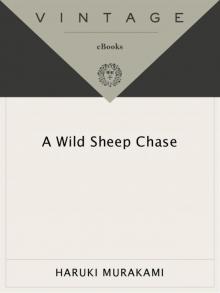 A Wild Sheep Chase
A Wild Sheep Chase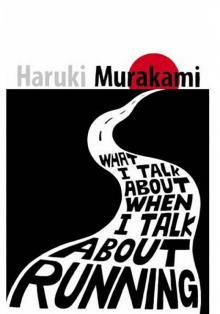 What I Talk About When I Talk About Running
What I Talk About When I Talk About Running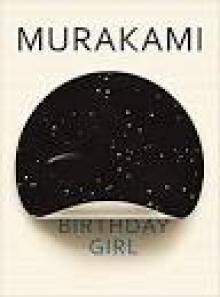 Birthday Girl
Birthday Girl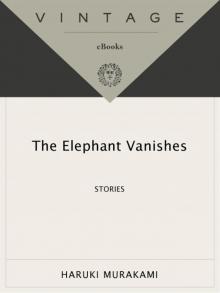 The Elephant Vanishes
The Elephant Vanishes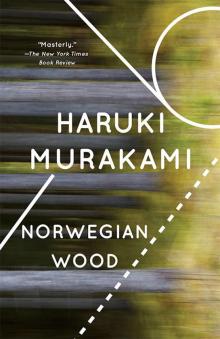 Norwegian Wood (Vintage International)
Norwegian Wood (Vintage International)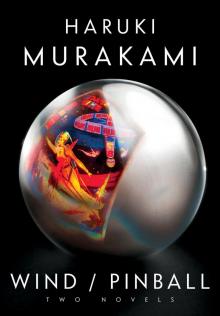 Wind/Pinball
Wind/Pinball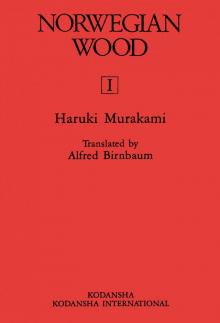 Norwegian Wood Vol 1.
Norwegian Wood Vol 1. Underground
Underground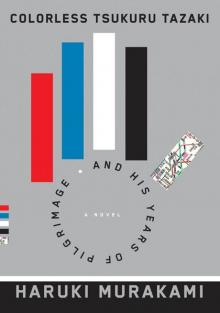 Colorless Tsukuru Tazaki and His Years of Pilgrimage: A novel
Colorless Tsukuru Tazaki and His Years of Pilgrimage: A novel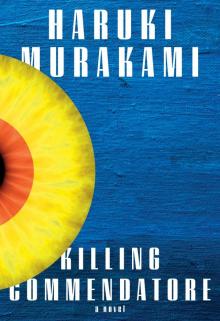 Killing Commendatore
Killing Commendatore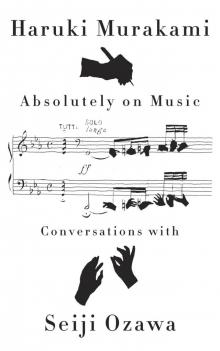 Absolutely on Music
Absolutely on Music